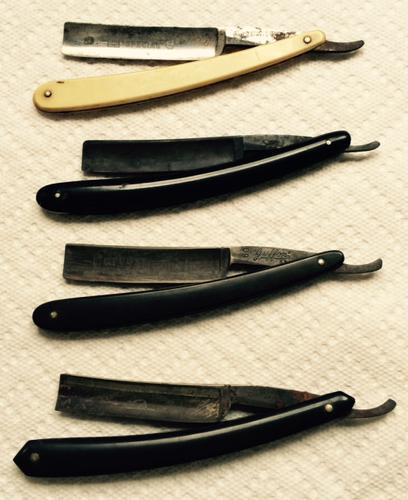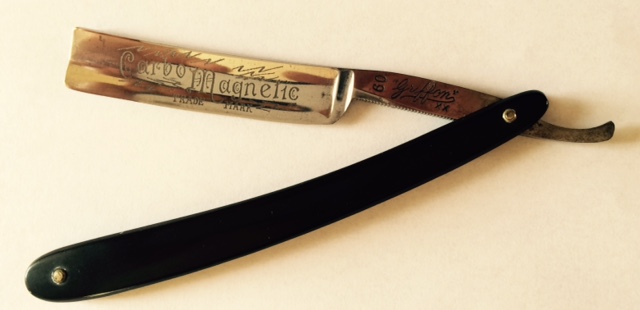Results 1 to 9 of 9
 19Likes
19Likes
Thread: How much imperfections to leave on a blade?
-
06-02-2016, 09:02 AM #1
 How much imperfections to leave on a blade?
How much imperfections to leave on a blade?
I am new to restoring SRs. I have been reading and watching videos on hand sanding/polishing restoring SR blades. The question I have is how much imperfection should I leave on the blade? I realize the answer is probably YMMV.
A mirror finish and a lot of manipulation of the blade seem to me will increase the chance of damaging the edge. I like the idea of leaving a bit of character in the blade. Should I be aiming for a NMF? Should I leave any pitting? Is this just a cosmetic thing? Can hand sanding remove discolouration of the metal?
-
06-02-2016, 09:21 AM #2Senior Member



- Join Date
- Mar 2012
- Location
- Thunder Bay, Ontario, Canada
- Posts
- 17,334
Thanked: 3228
Yes it is a YMMV type of thing. For one thing there is only so much metal you can remove without literally sanding a hole in the blade in an extreme example. I would do just as much as you are comfortable doing and leave the rest. Some pitting on the blade is no biggie so long as the active rust is gone.
With any polishing or sand papering you are going to have to reset the bevel and rehone the razor. If you have rust on the bevel itself then you will have to hone up past that to get to fresh metal with no rust anyway.
BobLife is a terminal illness in the end
-
The Following User Says Thank You to BobH For This Useful Post:
Whizbang (06-02-2016)
-
06-02-2016, 11:58 AM #3

Unfortunately there is no one size fits all answer. I would say it is up to you as to what you prefer to look at and how much time you are willing to put in to sanding. Most of my old razors are near mirror finish but small pitting or discoloration still exists. Mine are that way because I thought, "that is good enough" and didn't want to remove too much metal.
-
The Following User Says Thank You to Quixoticshaver For This Useful Post:
Whizbang (06-02-2016)
-
06-02-2016, 12:31 PM #4I used Nakayamas for my house



- Join Date
- Aug 2009
- Location
- Des Moines
- Posts
- 8,664
- Blog Entries
- 1
Thanked: 2591
There are several things to consider here.
First of all the blade will let you know how much steel can you remove from it. Full hollows have little to offer in that department while heavy grinds allow for a lot of steel to be taken off.
The second consideration is what finish you are doing. Satin finish will hide more imperfections that mirrored finish.
Another consideration is how much time you want to invest in a razor. The more refined the finish the more time it will take.
In the end you decide how far you will go so that the razor matches your vision of aesthetics.
I personally like my restorations as flawless as possible with finish as close to factory as possible and that is not doable by hand. Even with proper tools it is a time consuming process.Stefan
-
The Following User Says Thank You to mainaman For This Useful Post:
Whizbang (06-02-2016)
-
06-02-2016, 02:24 PM #5Senior Member




- Join Date
- Feb 2013
- Location
- Haida Gwaii, British Columbia, Canada
- Posts
- 14,454
Thanked: 4830
There have been some very good answers so far. I would like to add that pitting in itself does not repeal me, dirty pitting does. As long as the black rust gets removed from the blade, it has had it's life extended. At 150 years old I think they look great with some imperfections and a perfect patina They are very hard to find that have been that well care for for all of their lives. Sometimes the best thing we can often do is simply clean them and let them be old razors. Don't get me wrong, I'm not saying I do not like a nice crocus fish on an old blade, but they may not do well that way. After you do a few restores you will get to feel what level of restore you could or should do with a given blade.
It's not what you know, it's who you take fishing!
-
The Following User Says Thank You to RezDog For This Useful Post:
Whizbang (06-02-2016)
-
06-02-2016, 02:37 PM #6

I tend to agree. The reason I am restoring is because I like vintage razors. I could buy new and get a perfect razor...but where is the fun in that?! I like a razor with a bit of character...something that looks like it has a history and a story to tell. The razors I have are hollow ground and they seem pretty thin to my untrained eye. I am fine with cleaning them up and sending them out to be honed. Thanks for the advice.
-
06-02-2016, 02:42 PM #7At this point in time...




- Join Date
- Jun 2007
- Location
- North Idaho Redoubt
- Posts
- 27,068
- Blog Entries
- 1
Thanked: 13249
How are you testing the Hollows to see how far you can take the sanding ???
The heavy steel you can go as far as you want, in fact you could re-grind them, I always recommend learning on heavy steel...
-
The Following User Says Thank You to gssixgun For This Useful Post:
Whizbang (06-02-2016)
-
06-02-2016, 02:53 PM #8

Last edited by Whizbang; 06-02-2016 at 02:56 PM.
-
06-02-2016, 05:02 PM #9At this point in time...




- Join Date
- Jun 2007
- Location
- North Idaho Redoubt
- Posts
- 27,068
- Blog Entries
- 1
Thanked: 13249
I have this hint around here someplace but I will post it again,,,
Before you even start sanding/buffing a Hollow you want to "Thumb the Blade" and make it sing, get a good ear on it of what the "Ting" sounds like..
As you sand and buff check that "Ting" a few times as you progress, if you hear that tone flatten out, STOP !!!!! you are done.. If you go to much farther the blade will be compromised.. This is also a great test for those of you trying out your new buffers and Greaseless compounds the "Ting" will change if you heat up the blade and lose the Temper
Go slow and stay "Cool"
-
The Following 3 Users Say Thank You to gssixgun For This Useful Post:
cudarunner (06-04-2016), dinnermint (06-02-2016), Whizbang (06-03-2016)



 LinkBack URL
LinkBack URL About LinkBacks
About LinkBacks






 Reply With Quote
Reply With Quote


